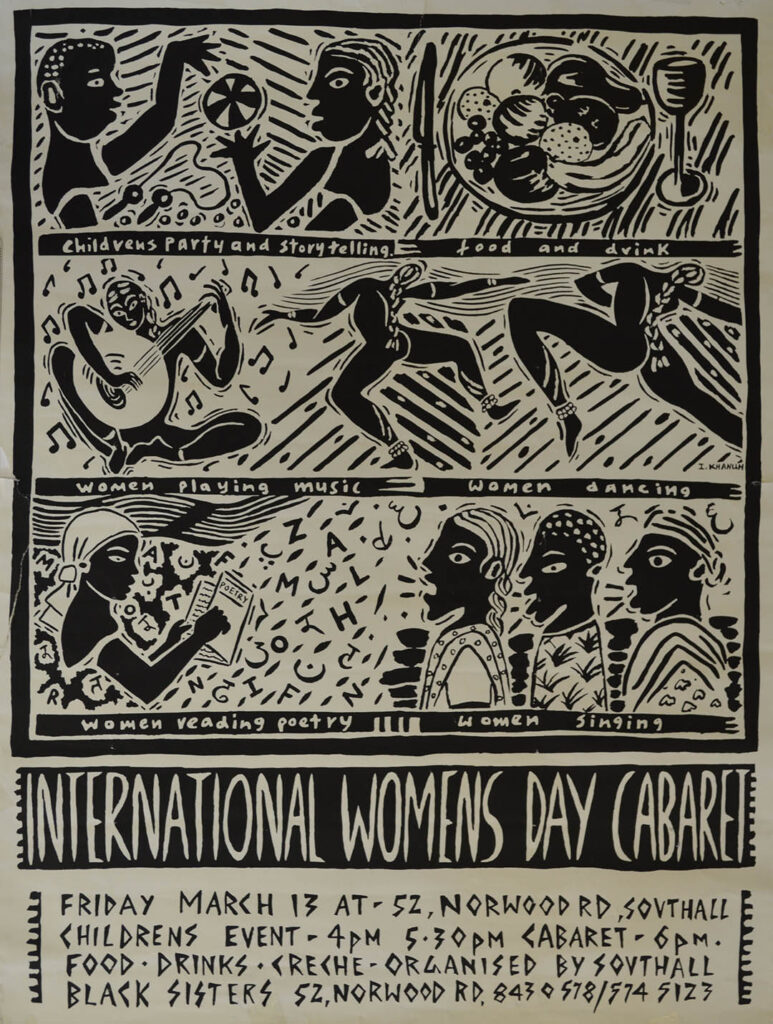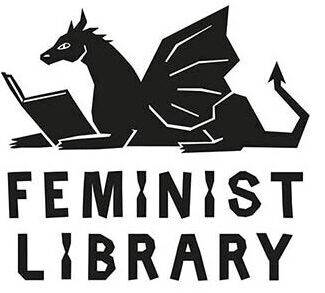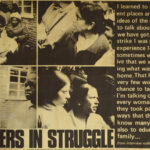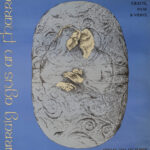Text by Abbie
‹ Return to Text by Abbie

In 1979, Britain saw the beginning of Thatcherism, increasing welfare retrenchment, racism and anti-immigration sentiment. Several anti-racist and (white) feminist movements sought to respond to these political issues, however, these mobilisations often failed to account for the multidirectional Iforms of violence experienced by racialised women. It is under these contexts that the Southall Black Sisters (SBS) emerged in 1979.
Pragna Patel – one of its founding members – explains that the formation of the SBS marks one of the first moments in Britain whereby South-Asian women worked alongside Afro-Caribbean women to create spaces which insisted on the agency and dignity of racialised women. The poster demonstrates the SBS’s commitment to producing spaces where marginalised women are actively protected, valued, and celebrated. As indicated by the poster, SBS would hold a celebration of International Women’s Day (IWD), with women, mothers and children invited.
I was struck by how the authors of this poster imagined the celebration of women’s life and how this imagination manifests spatially. In this poster we catch a glimpse of presents and futures where collective freedom is not simply theorized but also practised. The middle of the poster illustrates my interpretation. We see that space is filled by figures in motion, people dancing. One figure throws their arms widely, almost in a way that resembles the stance one takes when they are about to embrace another person. The other figure is fixed in the air, enchanted by the musical notes. These figures, despite being static illustrations, are moving unreservedly and unabashedly. These figures are not contained, instead they are spreading themselves, sharing themselves, filling the air with their songs, poetry food, games, toys, and life. It’s the sharing of life, poetry and songs which fills the air with meaning. The letters, poetry and melodies eventually blend together until they are incoherent. Instead, the lines, the swirls and the dancing (partially) betray those desires which words simply fail to articulate. Desires for freedom! Each dance and each song is an expression of what life in liberation might look like. Individuals claiming, the right to eat, to dance, to move and live however they please. To live with each other in terms of mutual love, care and joy.
In a moment where Thatcher commented on Britain being “swamped by people with a different culture” this depiction of space and how racialised people might occupy space, specifically 1970’s Britain, is powerful. Today, in a moment where the British state seeks to further securitise its borders and criminal justice system, in this poster, we can find hope in a past where women, lived, danced, celebrated and exercised freedom in the face of (state) violence. While I do not wish to romanticise these histories or the work of the SBS, my interpretation of this poster gives me insight into the kinds of political dreams that the SBS had and the kinds of political dreams we can have for our future.
Bio
Abbie is a scholar interested and thinking and writing about human rights, anti-colonial politics and black Marxist feminism on her Medium: https://medium.com/@bmf_
She can also be found on twitter @_abbiet8
1 https://www.ucl.ac.uk/racism-racialisation/transcript-conversation-pragna-patel
2 https://blogs.lse.ac.uk/politicsandpolicy/talking-the-talk-immigration-policy-since-1962/


